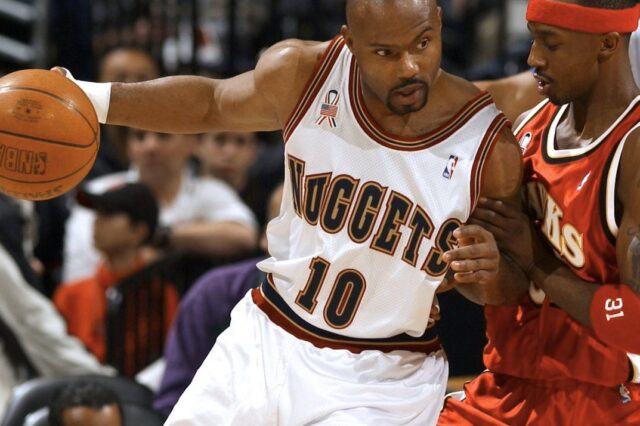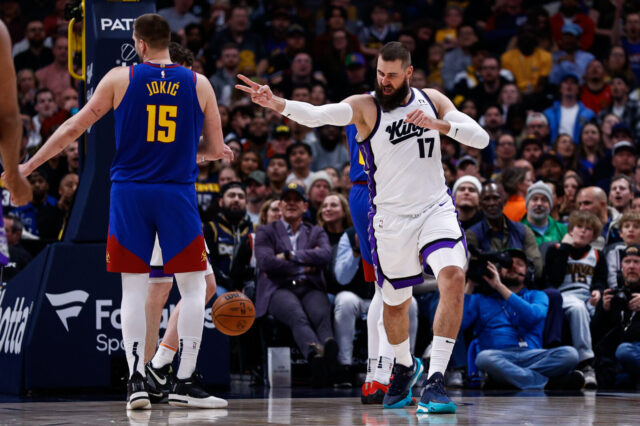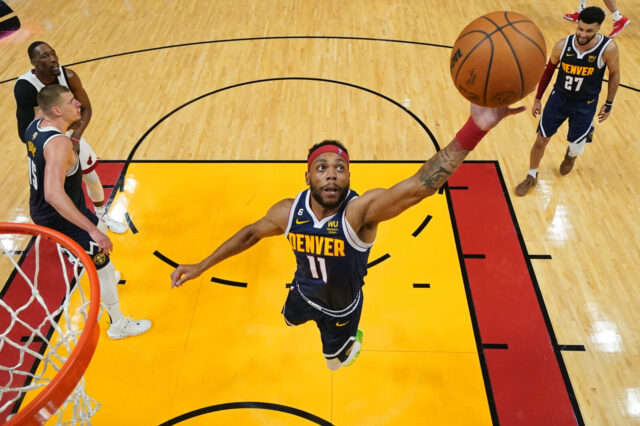Despite losing Jamal Murray for the rest of the season, the Denver Nuggets have stayed the course. With a 6-1 record in their last seven games and a general feel of stability and professionalism, the Nuggets are bouncing back in ways many did not expect. Nikola Jokić has produced in his regular MVP caliber ways, while Michael Porter has picked up the slack in his own right.
An unheralded reason why the Nuggets are winning games: rebounding.
As a team, the Nuggets have a defensive rebounding rate of 74.9% and an offensive rebounding rate of 29.3%. Both rank within the top seven of their respective categories and combined, Denver’s 52.2% rebounding rate ranks third in the NBA in the 2020-21 season.
Rebounding has always been an advantage, but without Murray, it has now become a necessity. Let’s discuss how and why the Nuggets have committed so heavily to rebounding lately and how it affects Denver’s future.
Who are Denver’s best rebounders?
The Nuggets have several players on their roster capable of making a difference rebounding the basketball, but none are more impactful than Nikola Jokić. Averaging 11.0 rebounds per game, a number that ranks ninth among the NBA’s league leaders, Jokić makes the most of his 6’11” height and 7’3” wingspan. The Serbian center leads the NBA with 53 double-doubles, and many of those are achieved with his consistent rebounding. Jokić has grabbed at least 10 rebounds in 42 of his 60 games played this season.
Flanking him at the two forward spots are Michael Porter Jr. and Aaron Gordon. Both players are at least 6’8” and incredibly athletic. Both have a nose for the basketball and help the Nuggets clear defensive possessions and create new offensive possessions. Porter in particular has excelled, averaging 7.6 rebounds per game as Denver’s second leading rebounder. Porter uses his 6’10” height, plus athleticism, and good instincts to attack the glass with consistency. Porter has grabbed at least seven rebounds in 33 of the 51 games he has played this season, including 23 games with multiple offensive rebounds.
This content is no longer available.
Gordon, though he only averages 4.8 rebounds per game, is an asset for the Nuggets. There are only so many rebounds to go around, and Gordon often contributes to the overall team rebounding by simply being on the court. The Nuggets generate a 54.5% rebounding rate with Aaron Gordon ON the floor, compared to a 53.2% rebounding rate when he sits. Gordon may not be the reason the Nuggets rebound so well, but adding his 6’8” athletic frame to the mix helps everyone else on Denver’s roster.
In the backcourt, the Nuggets have two guards that rebound well for their positions: Will Barton and PJ Dozier. Barton averages 4.0 rebounds per game, an impressive number for a 6’5” wing player listed at 181 pounds. Even better on a per minute basis is Dozier, who averages 3.7 rebounds in just 21.2 minutes per game. Dozier’s estimated 10.0% rebounding rate is the highest among Nuggets guards, affording the Nuggets extra size and athleticism in the back court without altering their identity.
Finally, coming off the bench, the Nuggets have three forwards are centers that attack the glass consistently: JaMychal Green, Paul Millsap, and JaVale McGee. All three have their own rebounding strengths, and most combinations that include two of the three players help the Nuggets out-rebound the opposition.
How the Nuggets are rebounding even better than before
Before the Nuggets acquired Aaron Gordon from the Orlando Magic, the team made a conscious choice: they weren’t big and athletic enough to compete with top teams in the NBA. Denver had finally settled on a starting lineup that included Michael Porter Jr. out there, but it also included three guards, making Denver undersized against the NBA’s best. Insert Aaron Gordon for one of the guards, and the Nuggets suddenly became one of the NBA’s bigger, more athletic teams.
Since Gordon’s first game in a Nuggets uniform against the Philadelphia 76ers on March 28th, the Nuggets are 13-3, possessing the best record in the NBA. During that time frame, they’re maintaining a 54.3% rebounding rate, the best in the NBA by far.
This content is no longer available.
By simply adding an extra big body into the mix, the Nuggets have turned one of their strengths into a legitimate issue for the rest of the NBA. Crashing the glass relentlessly has afforded the Nuggets extra opportunities, and it has worked in tandem with improvements on both the offensive and defensive side of the ball. When in doubt, the Nuggets fall back on rebounding, and it works.
Why rebounding matters
Quite simply, the game of basketball is a game of possessions, specifically how well one team does when they have the basketball versus how well their opponent does. Rebounding is all about possessions, and the ability to maximize opportunities to score for your team while minimizing opportunities for the opponent. A team that rebounds well gives themselves more opportunities to score, in aggregate, than their opponent, increasing their margin of error to win games.
The Nuggets have a 31-9 win-loss record when out-rebounding their opponent. Michael Malone has consistently preached the importance of rebounding, and the Nuggets respond well to dominating the glass. Denver’s 9-12 win-loss record in all other games should be a testament of the importance of rebounding, at least for the Nuggets. Other teams may find ways to excel, but the Nuggets have found their formula: by using their dynamic size, athleticism, and rebounding instincts to their advantage, the Nuggets possess a leg up on the competition in a very specific way.
If the Nuggets make the playoffs and find themselves matched up against a tough opponent, they will have their work cut out for them. Jamal Murray’s absence will affect everything, as will potential nagging injuries to Will Barton and Monte Morris. The best Denver can hope for is to rely on their other strengths. Attacking the offensive and defensive glass may swing an extra two or three possessions in their favor every game, and that could be the difference between winning and losing a playoff series.
For now, the Nuggets just keep winning, and rebounding is one of the most important ways they’ve managed it. A marginal advantage for some, but a foundational tenet of the Denver Nuggets.
This sponsored post was published according to our guiding principles.


